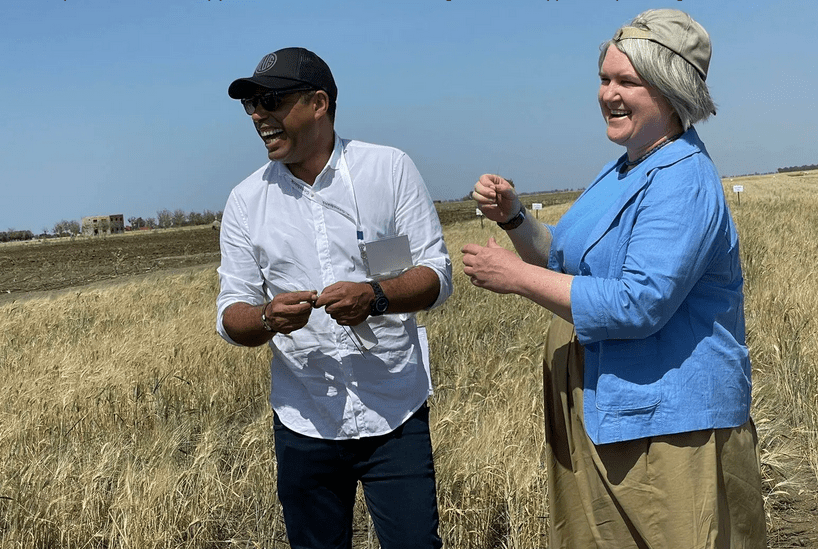
ICARDA research team leader Dr Zakaria Kehel and CGIAR global director, genetic innovation Dr Vermeulen. Photo: ICARDA
THE International Centre for Agricultural Research in Dry Areas (ICARDA) Morocco Genebank was officially opened last week to safely store one of the world’s most unique and extensive collections of wheat, barley, chickpea, faba bean, and lentil.
The facility has been developed by ICARDA with support from The Kingdom of Morocco, INRA, and the Global Crop Diversity Trust, and supplements ICARDA’s existing genebanks at Svalbard in Sweden and Beirut in Lebanon.
ICARDA genebanks hold material deemed to be International Public Goods, which makes it accessible to all including breeders and researchers across the world.
The ICARDA Morocco genebank alone conserves and researches a collection of 95,000 accessions, or groups of plant genetic resources, collected from the region.
This plant and seed material is the ancestors of today’s crops that have evolved in the wild in a harsh environment of water scarcity and heat.
It offers the keys to climate-resilient traits that can help strengthen global crops in the face of stresses such as soaring temperatures, pests, and water scarcity, and many of these plants are threatened in the wild.
This genebank is the third that ICARDA has established since the research center was founded in 1977.
In the storage rooms of the first genebank that opened in 1989 near Aleppo in Syria, ICARDA conserved a collection of 145,000 accessions of cultivated crops originating from the Fertile Crescent and the wider region.
By 2012, the nearing conflict urged ICARDA scientists to ship duplicates of the vast seed collection to the safety of other reliable genebanks’ vaults, including the Svalbard Global Seed Vault in Norway.
By then, ICARDA was already in the process of relocating its genebank system to Lebanon and Morocco.
Those present at the opening included Morocco’s Minister of Agriculture Dr Mohamed Sadiki, CGIAR regional director of CWANA and ICARDA director-general Aly Abousabaa, INRA Marocco director Dr Faouzi Bekkaoui, of , International Treaty on Plant Genetic Resources (FAO) secretary Kent Nnadozie, The Crop Trust head of programs genebank platform coordinator Dr Charlotte Lusty, and CGIAR global director, genetic innovation Dr Sonja Vermeulen
Material held in the Morocco facility
Research into this genetic material also forms the basis of breeding programs to deliver sturdy domestic alternatives to the widely imported staple crops under pressure today.
“Today is a historic day for food security in Morocco and the region; genebanks are the building blocks of climate-proof food systems,” Dr Bekkaoui said at the opening of the Morocco facility which was attended by more than 150 people.
Along with officials, leading scientists in the field of genetics, agronomy, and breeding were also present at the event, as were “the forgotten heroes” in the genetic resources sector, the genebanks researchers, students, lab assistants, and technicians.
Morocco itself is a stark example of why conservation and research of hardy plants from the region are so important to make future food systems climate-proof, with its farmers still reeling from the consequences of the “drought of the century” that devastated this year’s harvest.
Ongoing conflict in Europe which has disrupted cereal imports for many highly dependent countries, including Morocco, is seen as making the case for an overhaul of food systems urgent, beginning with a strengthening of the genebank system.
“It is our obligation, in partnership, to capitalise on what this region offers as a living lab, to provide the world with the building blocks for climate-proof food systems,” Mr Abousabaa said.
They offer the keys to climate-resilient traits that can help strengthen global crops in the face of stresses such as soaring temperatures, pests, and water scarcity. And many of these plants are threatened in the wild.
“Supported by our global partners, the new OneCGIAR’s improved systems help farmers to become more agile in the face of serious and changing challenges,” Dr Vermeulen said.
The new ICARDA Morocco genebank is supported by the Kingdom of Morocco, CGIAR Genebank Platform, Deutsche Gesellschaft für Internationale Zusammenarbeit (GIZ) Genebank attributed funding, the European Union, and the Global Crop Diversity Trust.
Source: ICARDA



HAVE YOUR SAY